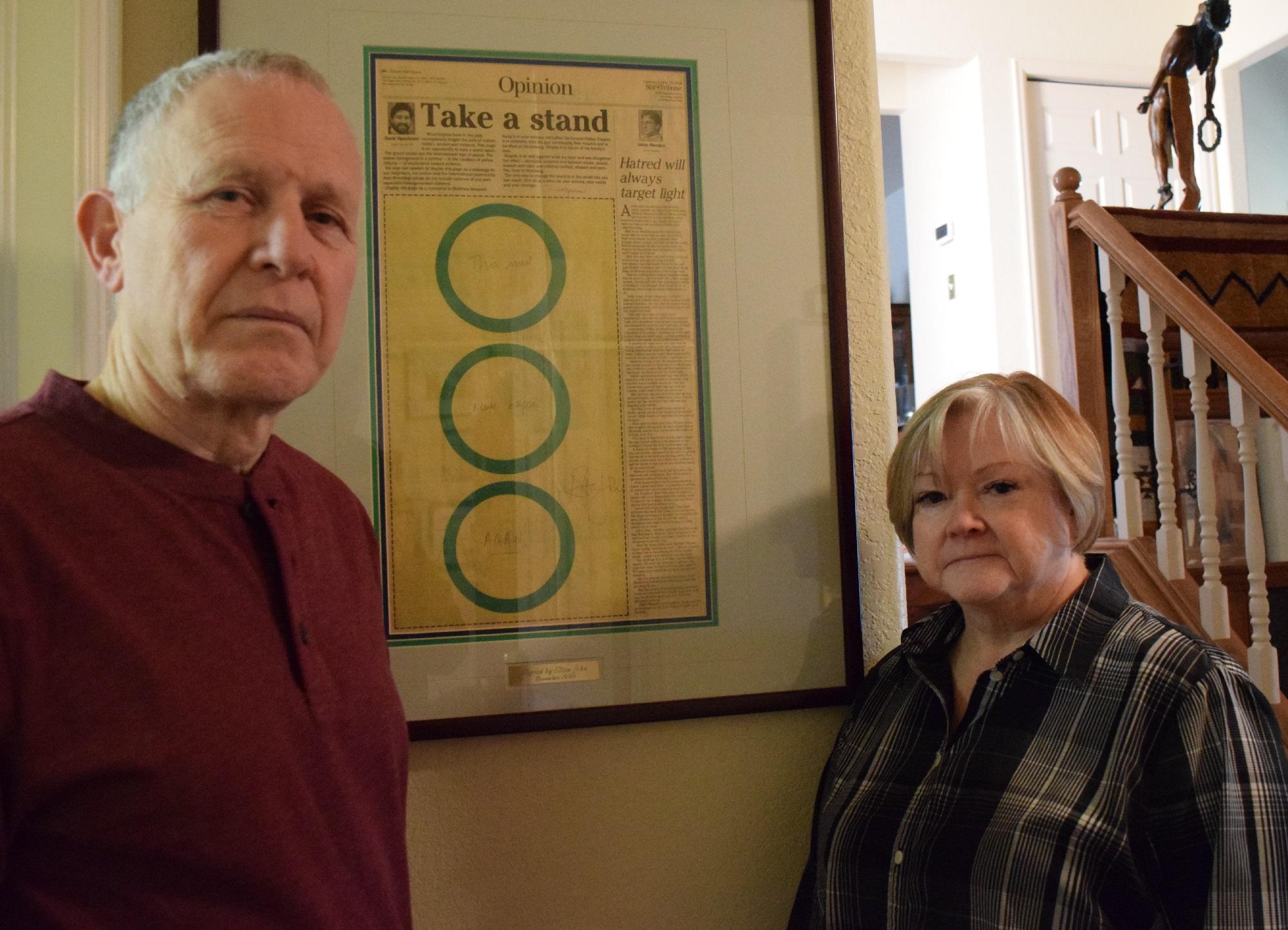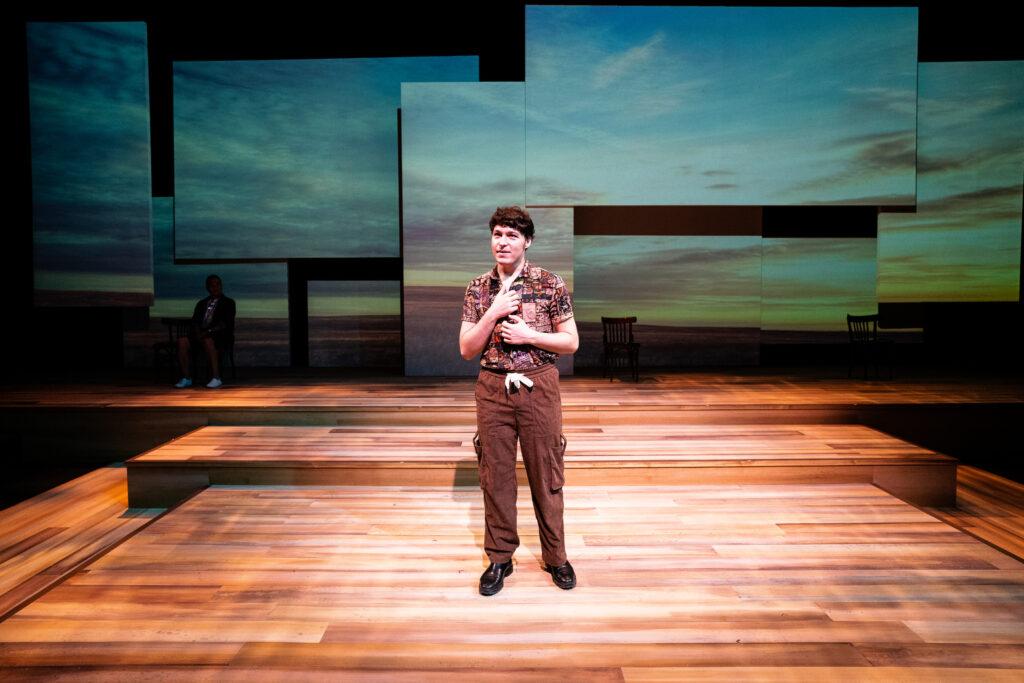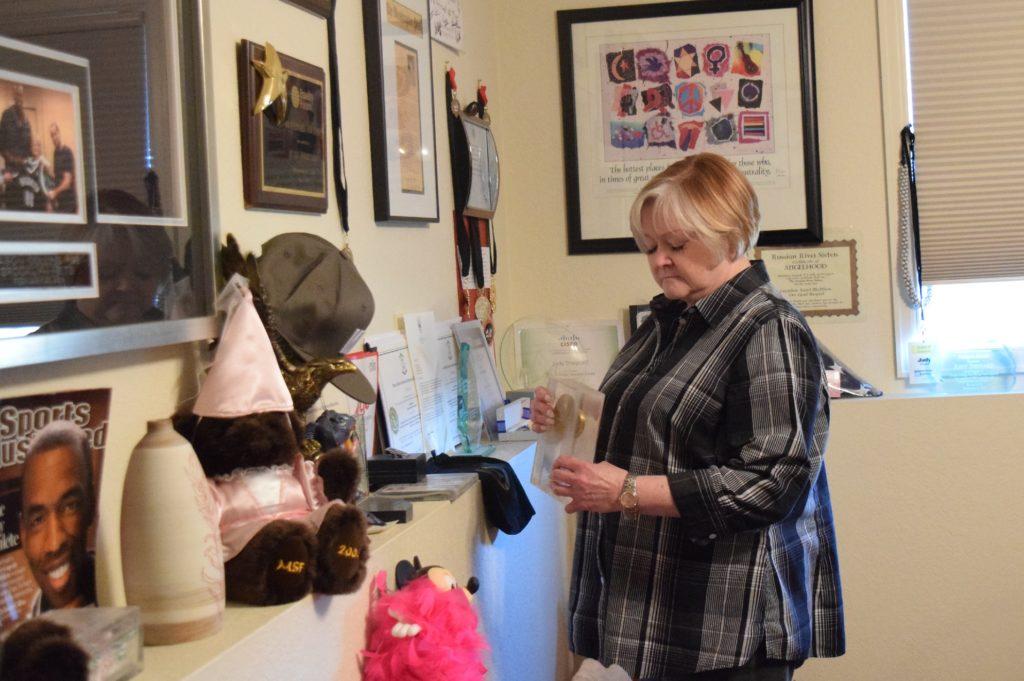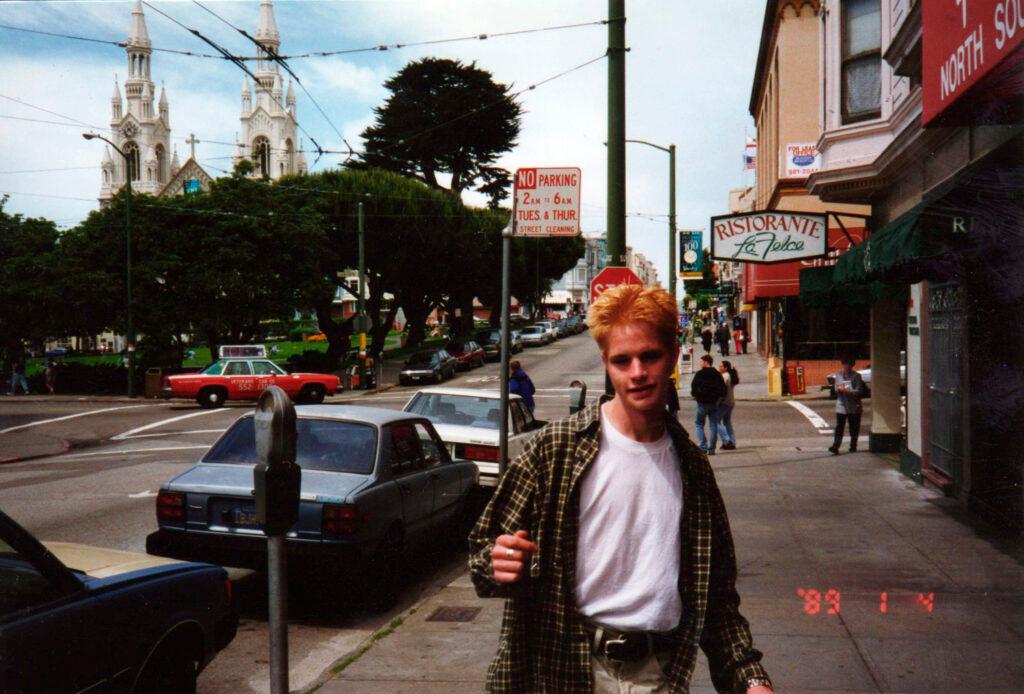
This Thursday marks 25 years to the day since the murder of Matthew Shepard. The University of Wyoming student was brutally attacked by two men, and left tied to a fence outside of Laramie. He was only 21 when he died of his wounds at a hospital in Fort Collins.
Shepard was openly gay and his killing sparked a national conversation about hate crimes. In the quarter century since his death, his parents, Judy and Dennis Shepard, have worked to empower and support the LGBTQ+ community. They founded the Matthew Shepard Foundation and helped pass the first federal hate crime laws.
Today the foundation continues to advocate for the safety and rights of the LGBTQ+ community. It runs anti-hate crime trainings for law enforcement officers as well as offers curricula and speakers for schools, colleges and conferences.
Shepard’s death sparked a number of artistic works, from a choral oratorio to the groundbreaking play, "The Laramie Project," a documentary theater project that tries to capture the community’s response to Shepard’s murder through the residents’ own words.
The Matthew Shepard Foundation supports local groups that perform these works, including providing photo and video resources for productions of “The Laramie Project,” offering historical background and cultural context, and helping to organize cast chats and post-show Community Talkbacks.
A restaging of “The Laramie Project” is running now at the Arvada Center and the Shepards will be there in person for talkback sessions on Oct. 28 and 29. (The Arvada Center is a financial sponsor of CPR but has no editorial influence.)

The Shepards recently sat down with CPR to reflect on their journey as advocates for LGBTQ+ rights and the impact it has had on their lives, as the fight for equality has continued in the 25 years following Matthew's death.
Dennis and Judy Shepard spoke with CPR reporter Eden Lane about the importance of allies in creating change and the continued relevance of telling Matthew's story. The couple maintain their hope for the future, particularly in the younger generations who have grown up in a more accepting world. And they emphasize that Matthew was a human being, not just a symbol or martyr.
Interview Transcript
This interview has been edited for length and clarity.
Lane: How are you doing this year?
Judy: For me, personally, it was harder than I thought it was going to be. We've been doing this work for 25 years now. I didn't think it would just be that much different just because it's 25 years, but it is, it's just harder to think we've actually been without Matt longer than we had Matt. I think that realization's just sort of hitting me.
Lane: It's not surprising to hear you say that this 25 year mark is a little bit more difficult than you may have expected. Partly because you have worked so hard in all of this time to spread a message and to build a legacy. Tell me about this experience for you, knowing the impact that you've been able to make after these horrific circumstances.
Judy: Well, I think the impact comes from: we just kept talking about Matt and telling the story Not specifically because it was about our son, but because it was a story that was happening to so many other folks as well across all of the marginalized communities and in particular now trans women of color. It's just a situation that I thought was getting better, but now we see it’s not.
I think we sort of viewed our job as being accepting parents, and helping other families become accepting of those who happen to be gay and still love them. But it's turned out to be so much different and we certainly didn't do this on our own. This was a lot of other people and a lot of other organizations all fighting at the same time for the same thing, which is equity in our country and not just for the LGBTQ community, but all the marginalized communities. We're just kind of in a mess right now.
Dennis: Yeah, particularly from the previous administration. When we were on a roll, all the kids are thinking everything is going to be good because we're getting everything we want. All our friends are too. And suddenly they find out they don't have what they thought they had. And that hit 'em right in the face with what happened with the Dobbs decision, that anything and everything can be taken away if they don't pay attention.
Lane: How do you fortify yourselves while you're doing this work?
Judy: We kind of have a new family now, and it's their commitment that keeps me going and knowing that they're still fighting for that and I need to still fight for that as well, as long as I can. We're doing it for them still, so as long as things are still a mess, we'll be here as long as we can.
Dennis: I do it because I'm an angry dad. We have a younger son who's straight, but if Matt were alive today and you put them both together, he would not be the equal of his straight brother when it comes to equal rights in this country.
It's a two tier system and that angers me tremendously. they're both born right here in Casper, Wyoming — basically the center of the United States or pretty close to it — and yet one has more rights, responsibilities, and privileges than the other one does.
Lane: What's it like for you and the community now? What has changed in these 25 years?
(Judy): Well, we live in Wyoming. That should give you a clue. Very red. It's extremely conservative. We have a legislature, in my opinion, that does not speak for the citizens of Wyoming. I dunno how they get elected, but maybe it's because people aren't voting. I don't know.
There can be Pride festivals in little towns in Wyoming, but we still have a legislature that's trying to take things away from them and absolutely not give them any protections at all. Not even hate crime protection. I kind of don't understand what's going on.
When I started doing this work here, people would come up to me in the grocery store when I would come home and whisper to me, ‘thank you for doing this work. I have a nephew or grandson or a friend who happens to be gay and I really appreciate it.’ Well, now they say it out loud. And at Casper, we had a three-day Pride event. Biggest attendance ever. I just know that the legislature is not speaking for the citizens.
Lane: You talked about how you have an extended family because of the Matthew Shepard Foundation and other organizations with whom you work. Tell me about that experience of talking to young people and families the way you have for all these years.
Judy: Well, in the beginning I spoke at a lot of colleges and I could see the fear in those kids' eyes and the parents, but my goal in doing those lectures was to set them on fire, to let them know that they had the power to make the changes and that voting counts. Elections matter and you need to have protections in place before people start to think about equality as something they can participate in.
But also in the beginning, there weren't many people running for office that the gay community could vote for. Nobody was running on a platform of equality for the gay community 25 years ago. It just wasn't done.
Dennis: And that voting she's talking about is not just at the national level, it's congressional district, county and state level also.
Judy: Yeah, we’ve always got to vote in the down ticket races, now that we have supportive candidates. So please everyone: vote. Please vote. Elections matter.
Lane: I know that you said, Dennis, that you're still an angry dad and there are other dads in positions where they might feel angry too for a variety of reasons, including some of the challenges that some families are facing in schools. What's your advice to other fathers who would also call themselves ‘angry dad’s?
Dennis: Don't be silent for one thing. You have to get out there and show in public that you love all of your children and you're supporting them and you believe that you should be the one making the decisions about their lives and not the legislature.
When we see the legislature, for example, in Texas and Florida and other states, taking away the decisions of the parents with their transgender children on psychological and medical treatment, I'm really frosted. I want to see one of these sets of parents go after, say the Florida legislature, all the Republicans or the Texas Republicans and sue all of them for child support.
If they're going to tell those parents how to raise their child, then they should be paying child support. Because these parents love their kids and they're going through the process step by step. They're doing the psychological, they're doing the medical, they're doing it carefully to make sure that their children are on the right path and that they're happy. So the dads need to get out there and get this settled: I'll raise my family. You raise yours and butt out.
Judy: I think people don't realize how important the allied voice is to getting things done. We can say things and do things that actual members of the community may not be able to get across. So allies have a very important voice, a very important role to play.
Dennis: And they have the strength of numbers. It doesn't matter what marginalized community you're in, allies as a whole outnumber everybody in each of the marginalized communities.

Judy Shepard among the many awards she and her husband, Dennis Shepard have received for their work in hate crime education on Jan. 8, 2019 in their Casper, Wyo. home. It’s been almost 21 years since their gay son, Matthew was killed.
Lane: When a family faces the kind of tragedy that you have faced, it's not uncommon for the relationships not to survive the journey. And your family has continued in ways that many families could admire. What's the secret to how you've been able to do this?
Judy: I don't know that there's a secret to it. We did things probably different than other families would have done because we weren't together. Dennis had to go back to work in Saudi. [Dennis Shepard spent his career working for Saudi Aramco's Dhahran safety operations] Our other son had to go back to boarding school and it was just me. So we grieved separately in our own way.
But also there was no guilt about what happened to Matt. We were not, ‘if only we'd been there, if only we'd done this or done that’ or whatever, and we didn't part in an angry manner. And so many times that is the case. All of that wasn't true for us. Matt would've been in Laramie and a student no matter where we lived. So that is not something that we had to overcome. And I know a lot of families, there's a lot of guilt for different things that maybe they would've done differently. I don't think we have encountered that.
Dennis: Yeah, I think it is just the fact that we were all apart, that when we got together it was more to rejoice that we were together and we could think about Matt, what we could do to help him and focus on the foundation. And instead of a couple staying together and looking at each other and having that survivor guilt or looking to blame the other one, we had other options and it worked out for us perfectly,
Judy: And we had a purpose. The purpose was to try to make the world a better place for Matt's friends and his peers, and it gave us a reason to move ahead.
Lane: What do you say to those that feel that the story of “The Laramie Project,” isn’t timely or important to continue telling?
Judy: I think it would be great if it really was not timely. However, there are hate crimes going against the LGBT community are on a rise. They have risen more in the last few years than they had in the past decade. It's incredible. The amount of hate crimes against all marginalized communities have gone up. The hate's just been unleashed.
Dennis: They started rising starting in 2016.
Judy: But just because if we talk about Matt, the story being about a young gay man, it’s more widespread than that. Let's put in a person of color or of a different religion or a different race into this story. It's exactly the same story. I hope someday it isn't relevant anymore, but today it's more relevant than ever, in my opinion.
Lane: I've witnessed how people react to you and how moved they are to meet you both in person. How do you take that in and how do you process the kind of reaction that you encounter?
Judy: I think from the very beginning, we understood people needed to share their stories. It's an honor that they trust us. There were so many young people whose families had rejected them who just wanted some positive voice. It was an honor.
Dennis: Yeah, I look forward to it because I went back to Saudi Arabia for 12 more years after we lost Matt. And when I started coming back on my vacations and going to these events with Judy to listen to her speak, or both of us speaking, I would run into what you might call the second generation.
These men and women are middle aged now, but they were in high school or college when they heard Judy speak, and a lot of them have told me, they came back to get another mom hug because they were on their last desperate legs. They were thinking about suicide and they'd just given up hope. And Judy spoke and they realized that they needed to keep pushing forward, not letting the other side win.
And so they're coming back just to tell their story and how successful they are now because she gave them that hope and that desire and that encouragement to push forward.
And I love it now because the young people, they don't know who Matt is. None of them were born. And so for them to hear the story and realize the amount of discrimination, they're shocked about it even though it's going on right now. So to me, it energizes me.
Lane: You talked about hope for them a couple of times, and I'm wondering if you have hope yourselves still. What gives you hope?
Judy: I don't think I could go on if I didn't have hope. What gives me hope now is the younger generations, they have grown up in a world of acceptance. They're not going to go back.
Dennis: They're pretty angry. You saw that in 2020 and 2022 in the elections. They realized they have the power of the vote and they don't care who's holding whose hand, opposite sex or same sex, it’s not a big deal to them. They're more concerned with gun violence, climate change, the war in Ukraine. What are they going to do when they get out of school? Are they going to have a job that's a priority? Who's holding whose hand means nothing.
And that's why they're going to make the changes. And I'm thrilled. Because the kids of 25 years ago, the ones who had all the candlelight vigils and the protest marches and everything, they did realize all the discrimination violence against the LGBTQ community. It woke them up. It woke us up. We didn't know.
And again, the kids from 25 years ago, who are now middle aged, they took that activism and angst with them. And you've seen that in the changes that have been made in various states in the hate crime laws and job discrimination, and even national corporations have changed their discrimination policies. Now, all of them are saying, ‘we don't care who you are. We just want you because we want the best, because we want to continue to succeed.’ And then the military, who were the ones primarily earlier against the LGBTQ community, now they are the only organization in the country where you have complete freedom, all the rights and all the benefits of every other American citizen.
So change is being made. We just have to keep reminding the young people that there's more to be done and they have to do it. They can't do it if they sit and watch somebody else vote.

Lane: I know you do so many interviews and I read and watch many of them, and I just wonder, what's the thing that you always hope you get a chance to say that you're not often given the chance to say because of time or they just didn't ask? What would that be?
Judy: I just really always want to remind people that Matt was a human being. Not …
Dennis: Not a martyr, not a saint. He had flaws. He was just, if you ever see the oratorio, “Considering Matthew Shepard,” one of the musical pieces in there describes him, and it gives him the title Ordinary Boy. He was no different than anybody else. And that's what we need to remind people.
The Laramie Project Talkback with Judy and Dennis Shepard October 28 & October 29
It's recommended you see a performance of The Laramie Project before attending this event at the Arvada Center.









